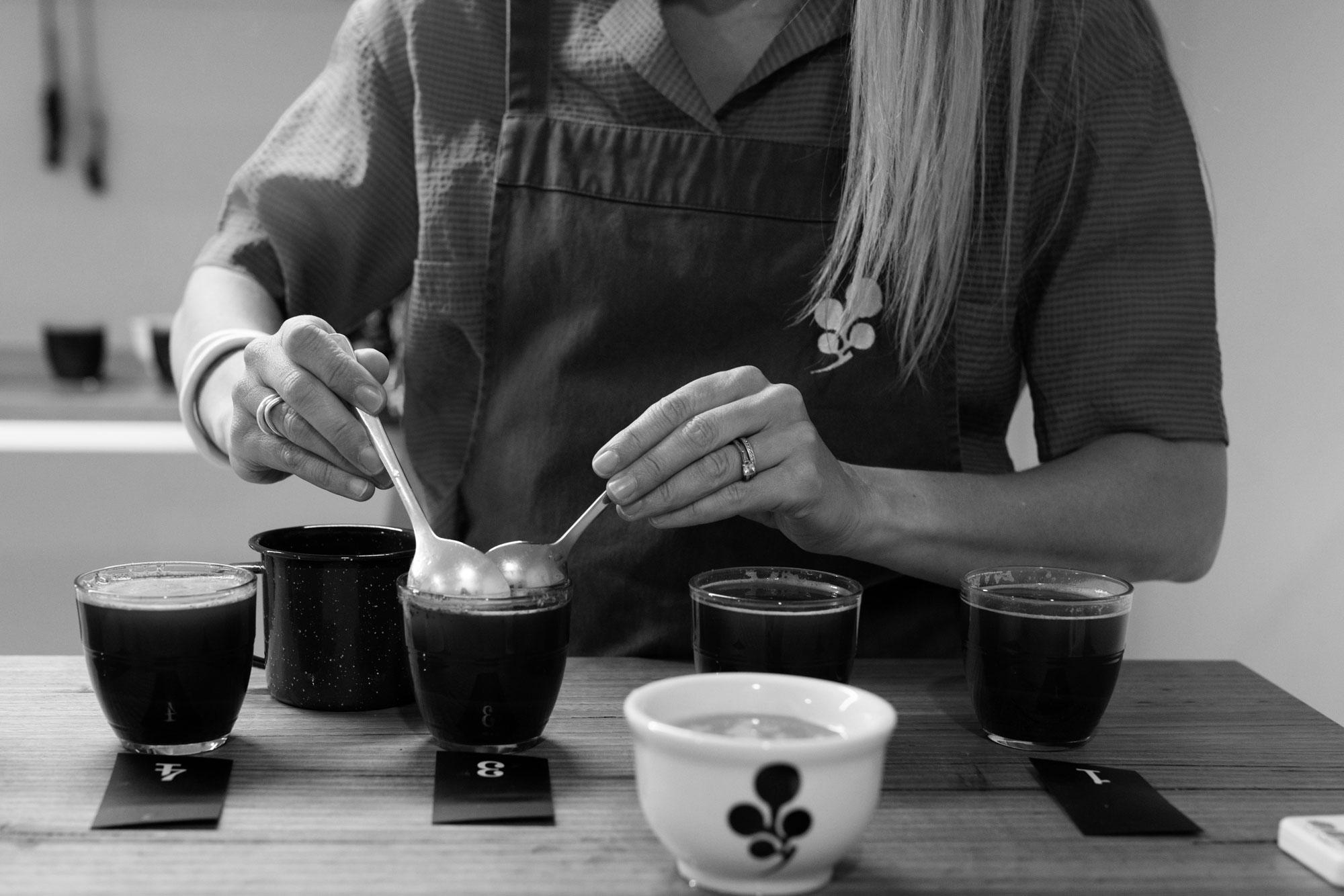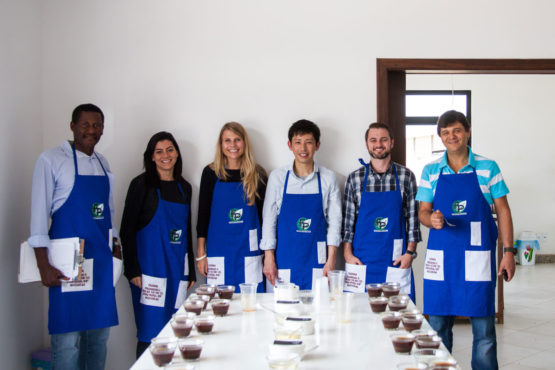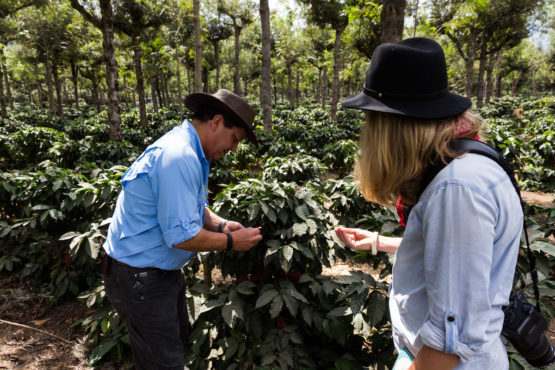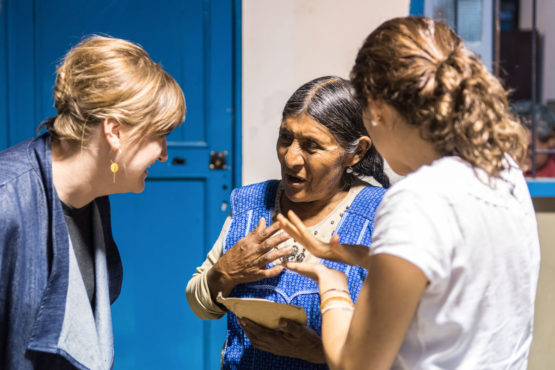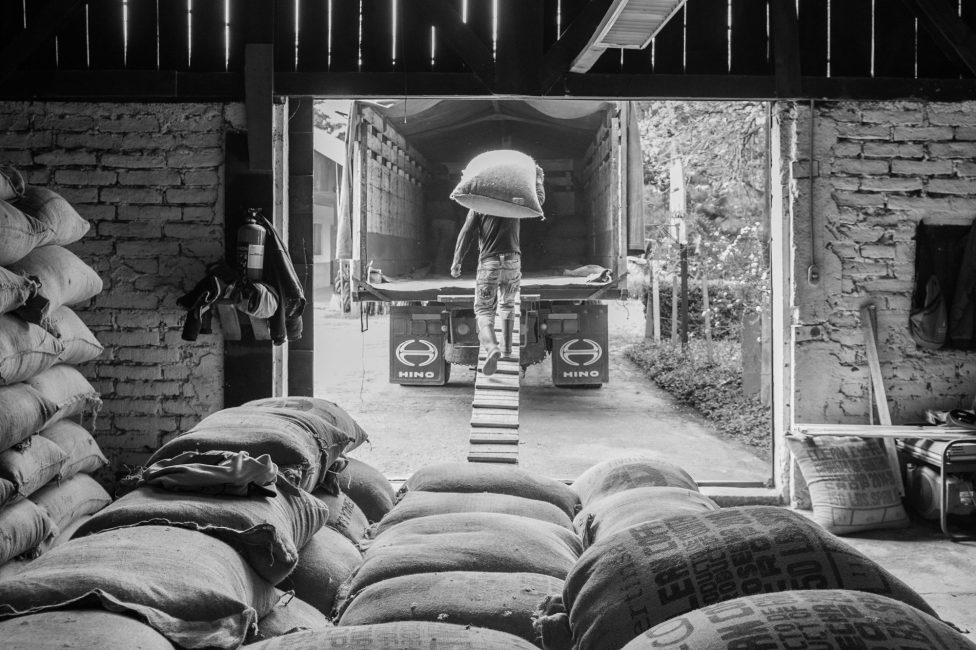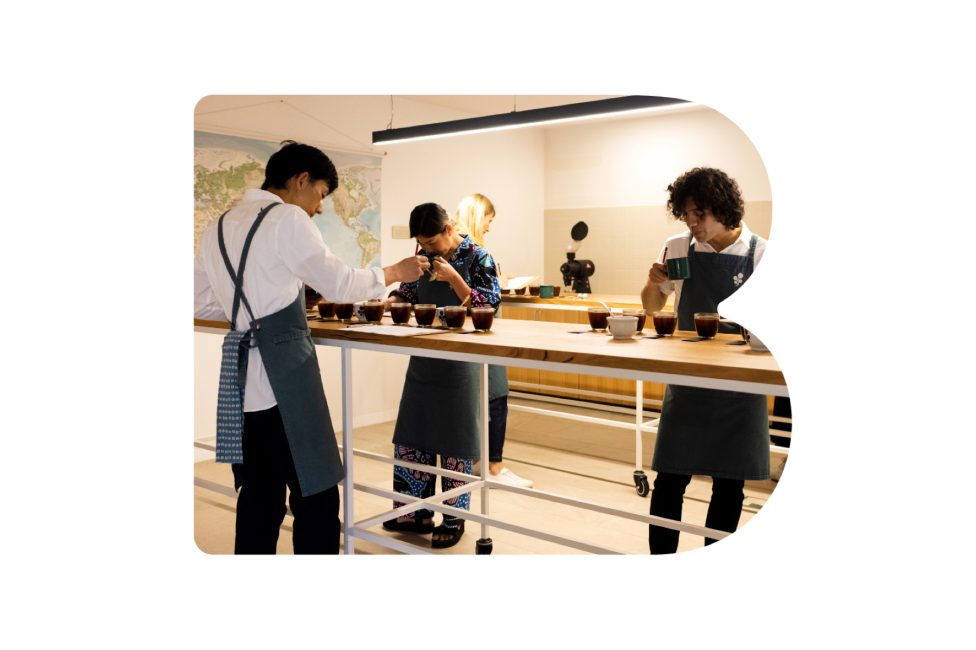How we buy coffee
Melbourne Coffee Merchants believes that everyone in the coffee chain can and should prosper, and that a commitment to paying producers good prices for coffee quality and suitability, regardless of the commodity market fluctuations, is the best way to ensure a sustainable and viable future for coffee farming. We have built our business around these beliefs and stand firmly behind our buying practices.
From the outset, Melbourne Coffee Merchants has been committed to paying premium prices for the coffees we source (prices that are in no way linked to the C market) and building long-term and mutually beneficial relationships with our producing partners. Our founding values of quality, transparency and sustainability inform all of our decisions and have a real impact on the way we buy coffee, the people we work with, and how we operate our business.
Working with our suppliers
We are privileged to work directly and independently with exceptional coffee producers who we truly respect and care about. Over the last fifteen years, we have purposefully kept our business small and quality-focused, consciously investing in a limited number of origins, and striving to represent these to the highest level possible. We aim to source the very best coffees we can find from a select group of likeminded producers, who share our values and are committed to quality.
Our goal in every origin we source from is to build longstanding, equitable, transparent and sustainable supply relationships. We invest a great deal of time and care into establishing and developing these relationships, whether that be with an exporter who connects us to talented producers, or directly with a single producer or cooperative. Each party along our supply chain adds value to the product, and we are proud to work with such skilled and dedicated professionals.
Ultimately, the success and longevity of our relationships depends on a high level of openness, honesty and trust; all of which we actively foster with everyone we work with. That’s why we try to visit all of our supply partners annually, and we remain in constant communication with them year-round via email, messages and video calls. For every coffee we purchase we prepare a detailed QC report, which tracks the quality of each coffee over its lifetime. We also keep our supply partners informed with their coffees’ sales performance (in the case of spot coffees) and details on where it was sold, along with any customer feedback. We are always transparent about our buying intentions as early as possible with them, actively sharing our own market challenges and opportunities with our suppliers. This constant back-and-forth helps us gain an intimate understanding of the complexities and local challenges the producers and exporters we work with face, encouraging us to try to find creative and meaningful ways to support them.
We are very proud of the producers we work with and are constantly blown away by their dedication, hard work and unwavering commitment to excellence. Their commitment makes us even more determined to build a market for their coffees and to support their work, by paying greater premiums for higher quality and committing to long-term buying relationships. We’re never just in it for one season, and the last 16+ years have proven that everyone benefits from these ongoing partnerships.
Read more about our supply partnerships via our Origin Pages.
How we select coffees
Every year, we put together a brief of what we intend to buy, and we share this with the supplier prior to the harvest. This is informed by our expectation of demand for that particular origin’s coffees, along with specific requests from customers, and is detailed in terms of cup quality and expected volumes. Where possible, we forward the contract, which gives the producer an assurance of how much coffee we will buy, and how much they can expect to make from that year’s sale (which can also help them secure financing pre-harvest).
During the trip, we cup through hundreds of coffee samples, looking for coffees that we love and that we think our customers will love. It’s important that we keep in mind the suitability of a coffee for a particular purpose, especially if we are buying it to meet a customer’s specific brief. Regardless of whether we have committed to procuring a certain amount of coffee, we always endeavour to select only the highest quality coffees on the cupping table.
We buy coffee for two purposes: selecting a pre-committed lot for a specific customer, or choosing a coffee to be added to our list as a spot offering, making it available for anyone to purchase, either ahead of landing (from pre-shipment sample) or once they have arrived in Australia (from landed samples). Head here for more on how to plan your green with us.
How we pay for coffee
When it comes to purchasing, our discussion around price with producers is pretty simple and straightforward, regardless of our intended use for the coffee. It usually starts with us asking what a producer wants for their coffee, and their answer is typically the price that we pay.
None of our purchases are linked to the commodities market. Where many specialty buyers will pay a differential on top of the current C price at the time of purchase, we take a different approach. Instead, we take into consideration the cost of production for the season in that particular origin, the quality of the coffee, the application and suitability of that coffee for our customers, and our ability to find buyers for it. We consider this approach to be the fairest and most sustainable way to purchase coffee.
Over the last decade and a half, we have stayed true to this purchasing model, regardless of fluctuations in the Australian dollar or changes to the commodities market, though what we pay for coffee can and has been increased and adjusted upward, as and when requested by the producer. This upward adjustment may be to cover increasing labour costs (labour shortages are a challenge for many of our producing partners), or competition for cherry (something that Rwandan washing stations face every year) or low yields (which many of our producing partners in Bolivia and Kenya have been tackling). We have also paid higher prices for higher-scoring lots or rare variety.
Outside of price discussions, identifying the motivations and needs of each of the producers we work with is imperative, as these can vary greatly from producer to producer. For some of our producing partners, growing our volumes is their priority. This may be because their capacity is growing, or because they want to sell more of the same grade of coffee at the prices we’re paying. In these situations, our priority is finding ways to grow with them, and helping them market and grow demand for their coffee. For other smaller producers, pre-committing to our volumes in advance is invaluable, as it helps them minimise their risk and get pre-harvest financing.
How we price coffee
As a general rule, for all of our coffees, we need to add a minimum gross margin of 20% to the landed cost, which covers overhead expenses like warehousing, handling fees, palletisation, sample distribution, financing, hedging, insurance, marketing, staffing and office space. This margin also covers the investment that we make in travelling to visit our producing partners year on year – to cup and select coffees, maintain and strengthen relationships, build trust, and to gather information, stories and photos of the people and farms we work with, which we then pass on to our customers. This commitment to traceability is at the core of MCM’s business practices, as we firmly believe the spotlight should be on the people and families who grow and process our offerings.
For spot coffees, we increase that margin to 25-30%, which covers the increased risk we take, due to delay, damage or loss in transit, having excess stock (that we may need to sell at a discount or loss), or any quality issues that might arise post-landing.
Some spot coffees are sold at a lower margin, however. In Bolivia, for example, the cost of production is high, and volumes are usually very low. As a result, we pay extremely high prices to account for this, which also ensures there is an incentive for independent producers to remain in the coffee industry. We sell our Bolivian coffees at a lower margin to make sure that their price remains competitive in the Australian market. We also invest heavily in education of the challenges of producing coffee in Bolivia, so that our roasting customers understand why the prices are high and why this is such an important origin to support.
Working with our customers
We believe the most sustainable model for purchasing coffee is when a roaster supports a specific supplier year on year, in committed, reliable and long-term buying partnerships. This may be through contracting a particular volume ahead of a buying trip, or by choosing to buy from producers whose coffees we feature on our spot list annually. We are here to help you plan your coffee offerings, to make this a more achievable goal. Read more about how to plan your green with us here.
We understand that many of our roasting customers are not in the position to pre-commit or travel regularly to origin. Frankly, they shouldn’t have to in order to make buying decisions that contribute positively to the communities that grow and process the coffee. Regardless of the point at which you purchase coffee, we offer full traceability on each and every lot that we sell; detailing where and how it was grown and processed, and celebrating the individuals and communities that produced it. We’re always delighted to share as much information we can about each of the offerings we source, and we regard our role in connecting producers and roasters as an important responsibility and a privilege.
Contributing beyond pricing
Beyond what and how we pay for coffee, we are actively seeking new and meaningful ways to contribute towards positive change across the coffee industry. We first do this through local initiatives (see a recent examples here), and later by trying to tackle the global issues our industry faces. We don’t have all the answers, but we are deeply committed to building a more sustainable future for coffee and we’re constantly working towards this goal.
Climate change stands as one of the greatest threats to the future of coffee, as it is having a significant impact on coffee production and the livelihoods of the most vulnerable people in the coffee supply chain. To that end, at the start of 2019 we became an active supporter of World Coffee Research (WCR), a non-profit agricultural research organisation that is urgently seeking and striving to address this issue. WCR’s mission is to grow, protect and enhance the supply of quality coffee, and the sustenance of those who produce it. By taking a coordinated, collaborative and worldwide approach to scientific research into coffee, WCR is working towards the creation of a toolbox of varieties, genetic resources and technologies that will support a more viable future for the crop’s production. Their findings are openly shared with producing countries, with the goal of improving and driving profitable agricultural practice, minimising environmental impact, and maximising farmer yields and income.
As World Coffee Research relies on funding from the global industry, we see it as vitally important to offer our support. Since becoming a supporter of WCR, Melbourne Coffee Merchants has donated more than $48,000 and has committed to sending $0.01 (AUD) to WCR for every kilogram of coffee that we sell. We strongly encourage our customers to consider doing the same and have made it easy for them to get involved. While the investment requirement is minimal, collectively this has the potential to be extremely powerful and impactful.
Another challenge facing our industry is the fluctuating price of coffee is traded at in the commodities market, which often falls well below the cost of production. While this threatens the future of all coffee, the industry has recognised that a new set of pricing benchmarks needs to be established for specialty coffee producers, the additional resources, labour and skill that farming specialty-grade coffee requires. For this reason, we have committed to sharing our purchasing information with the Specialty Coffee Transaction Guide, which is designed to give producers and buyers a reference for pricing their coffee beyond the C market rate.
This project relies on an expanding group of data donors, including Melbourne Coffee Merchants and many of our roasting partners. By donating all of our purchasing information to the study – including contract date, FOB price, origin, variety, lot size and cup quality – we are joining a group of dedicated roasters, importers and exporters hoping to create, and contribute to, a better understanding of specialty coffee pricing, and to help build an effective tool for producers and buyers to use when negotiating the price of a coffee. The ultimate goal of this project is to dislodge the specialty coffee market from its almost exclusive reliance on commodity indices for price discovery, and to create a new frame of reference.
Want to know more?
We are here to chat anytime! Please feel jump on the phone or email and let’s talk.
Want to start to planning your green with us? Read this post first and this one, and get in touch.
Read this little post we wrote about Why Transparency is important (and hard) and what we are doing about it.
